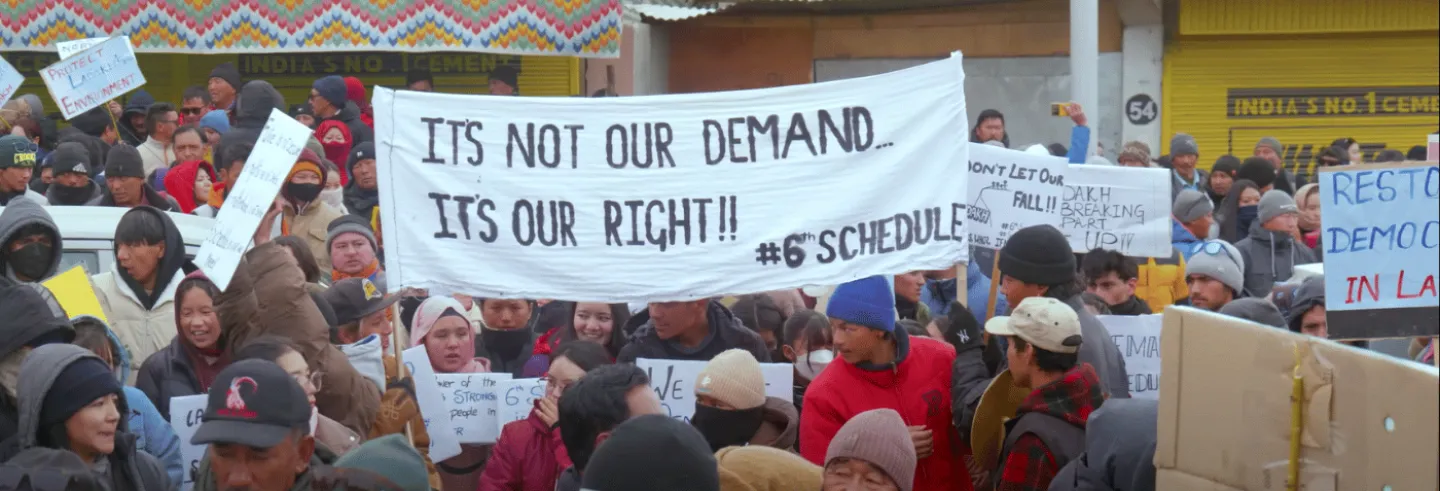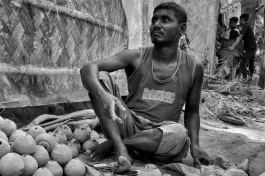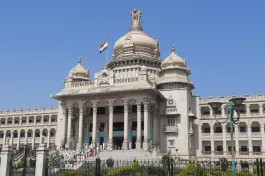Gyalson Urbis has been aspiring to be a Ladakh government officer for five years. Like thousands of other students in the union territory, this recent graduate maintains a rigid schedule of preparation for the civil service examination, sitting in front of his desk and pouring over books.
The irony is that there has been no notification for vacant administrative positions in Ladakh barring one for Staff Selection Commission posts. This has been a problem for the youth, who, ever since the abrogation of Article 370 in 2019 and the carving out of Ladakh as a union territory, are no longer eligible for government jobs in Jammu and Kashmir, which has a domicile requirement.
There has been a significant increase in the number of unemployed youth in Ladakh. When a notification for 797 non-gazetted posts was advertised in 2022, over 30,000 youths applied. Given the region has a population of around 3 lakh, the number of applicants demonstrates the level of unemployment, says Tundup Thinles, a former president of the All Ladakh Unemployed Youth Association. In the meanwhile, there has been an increase in the number of contractual employees, who do not enjoy all the privileges and rights of a regular government employee and whose jobs are not secure.
Ladakh has a literacy rate of 97%, but is one of the lowest ranking territories in terms of employment opportunities. Tourism provides much of the available jobs, even as it is seasonal.
Ladakh’s crisis is not born out of the potential conflict with non-residents – as residents of Jammu fear – but with geographic isolation, lack of legal clarity, and the political unrest surrounding the demands of its population.
Dorjay, who operates a taxi service in Leh City, holds a degree in pharmacy but has yet to find work in the government hospital. Consequently, he opted to work in the tourism industry to meet ends. Dorjay aspires to obtain a Master’s degree in medicine in the hope of securing a coveted position in the region’s sole government hospital. Many persons like Dorjay have not been able to pursue the professions they have degrees in and have taken positions in tourism, hospitality and education. They face the daunting prospect of preparing for jobs that offer no financial stability or juggling their studies with part-time employment.
All of this can only negatively affect the mental health of the youth. According to the National Health Resource Centre's 2021 report, alcohol consumption in Ladakh is significantly higher than the national average, with 23.6% of the male population and 3.8% of the female population consuming alcohol. Reliance on substances to cope with problems has led to an increase in mental health issues such as depression, tension, and stress amongst the youth.
***
The crises in Ladakh have most recently been brought to the fore by Sonam Wanchuk, a social activist, who along with 100 volunteers marched on foot from Leh to Delhi, to press the region’s demands, including on statehood, autonomy, jobs, and representation. One day before Gandhi Jayanti, the marchers were detained outside Delhi’s borders and later confined to Ladakh Bhawan in Delhi. In protest, Wanchuk and his supporters sat on a hunger strike for 15 days, before the home ministry agreed to resume talks on the protesters’ demands.
The residents’ demands are primarily related to job opportunities and the protection of cultural identity.
Wangchuk’s protests have their roots in the situation in 2019, when Ladakh became a union territory without a legislature. Since then, Ladakh's people and socio-political representatives have demanded inclusion in the Sixth Schedule of the Constitution, which would give Ladakh the power to create autonomous districts and regional councils with elected bodies. These councils would have power to make laws on forest management, agriculture, administration of villages and towns, marriage, land, and social customs.
In March 2024,Union Home Minister Amit Shah offered to extend protections similar to Article 371 of the Constitution to the region said it was unlikely to include the territory in the Sixth Schedule. Shah suggested that through the territory’s hill councils, the government would ensure the representation and participation of the locals and also provide 80% reservation in public employment. Wangchuk’s march to Delhi was to remind the union government of its promises.
***
Ladakh’s crisis is not born out of the potential conflict with non-residents – as residents of Jammu fear – but with geographic isolation, lack of legal clarity, and the political unrest surrounding the demands of its population. (Nityanand Rai, the union junior home minister, told Rajya Sabha in 2023 that there has been no land bought by outsiders in Ladakh since 2019, when domicile requirements were scrapped.)
Permanent Residency Certificates will provide job security to the local residents of Ladakh, but only if there is rapid recruitment against vacancies.
The residents’ demands are primarily related to job opportunities and the protection of cultural identity. Ladakh’s education system is unable to provide opportunities for students. Many government schools have equipment for smart classes installed, but they are defunct, as teachers do not know how to handle the equipment. Tertiary educational facilities are limited.
Since 2019, there has been a growing sense of distrust in the system, with demands for a Permanent Resident Certificate (PRC) and increased support for the territory to have its own Domicile Law. "There is an education gap that exists between Ladakh and other parts of the country, so if we are meant to compete and be on par with people who are coming from all corners of the country, then we must have adequate resources and help to grow and be compared to them," said Gyalson, the student preparing for government recruitment examinations.
Students like Gyalson continue to prepare for a promised future that hasn’t come any closer to being fulfilled. Permanent Residency Certificates will provide job security to the local residents of Ladakh, but only if there is rapid recruitment against vacancies. The resolution of this legislative gap should be prioritised to ensure that the territory does not remain marginalised.
Thupstan Tsewang is a member of the Ladakh Research Scholars Forum and has a Ph.D. from DIHAR-DRDO & Panjab University, Chandigarh. Akriti Kanodia is a fifth-year law student who worked in Ladakh as a teacher.










